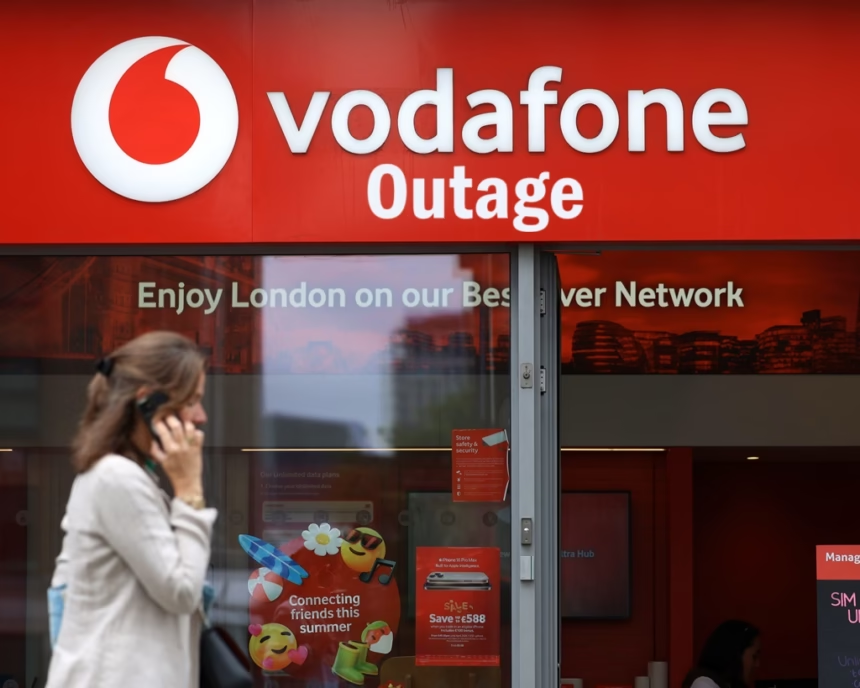LONDON — A routine Monday turned into chaos for Vodafone UK, with more than 130,000 customers suddenly offline across mobile and broadband. Users in London, Manchester, Birmingham, and Glasgow were cut off from 4G, 5G, and home internet for hours, sparking a wave of complaints and calls for compensation.
Fresh from its May merger with Three and now the UK’s largest mobile provider, Vodafone has been left facing a harsh lesson in how fragile constant connectivity can be. The trouble spiked at about 2:38 p.m. BST, mirrored by a sharp surge in reports on Downdetector.
At the peak, broadband sessions stalled, mobile data dropped mid-use, and even Vodafone’s app and website buckled, leaving self-serve tools out of reach. By 3:30 p.m., NetBlocks flagged a national outage, with live data pointing to near total disruption across Vodafone’s core data services. Old-school calls on 2G and SMS still worked, a small help for anyone who needed to send a quick update, but anyone dependent on data had no viable path.
Rumors spread as fast as the complaints. Early signs suggested a routing fault in Vodafone’s packet backbone, AS25135, where core prefixes appeared to vanish from global tables, which made parts of the network unreachable. Others pointed to a possible power issue at a major facility.
Security watchers eyed patterns that can precede a DDoS surge, given the strain on support systems and the website crash. Vodafone kept its statement tight, noting a major issue affecting broadband, 4G, and 5G, with engineers working at pace.
The company did not confirm any cyberattack. Three customers, despite the merger umbrella, were not affected, which raised fresh questions about integration between the two networks.
Vodafone Customer Anger
By late afternoon, the picture improved. Downdetector reports fell below 5,000 by 6 p.m., and a spokesperson told the BBC the network was recovering, with most users back online. Even so, there were patches of trouble into the evening, including broadband failures in busy areas, app login errors, and support queues at breaking point.
For customers on both mobile and home broadband with Vodafone, there was no easy fallback. One self-employed user on X wrote that having both services with the same provider costs half a day’s work. Small firms and payroll teams flagged lost time and delays, with clear knock-on effects.
Once connections returned for many, attention swung to compensation. Posts on X racked up likes from users still offline, asking when credits or refunds would land. Others vented about the incoming headache for call center teams.
With over 18 million mobile customers and around 700,000 broadband lines, this was more than a blip. It looked like a flashpoint for bigger complaints, and possibly legal action if losses pile up.
Ofcom’s Automatic Compensation Scheme sits at the center of this. Vodafone has been signed up since 2021, which means credits should be paid without users chasing, if delays pass the defined limits.
For broadband or landline faults that run more than two full working days past the fix date, usually 48 hours after the issue is reported, the credit is £9.76 per calendar day of further delay. Payments should arrive within 30 days.
Past Outages
Mobile is less clear-cut. Ofcom treats it case by case, but long data outages can lead to refunds or credits, especially if there is a clear financial hit. A few hours of downtime often falls short of automatic awards, though many users are keeping records, such as timestamps, screenshots, and notes on lost work, to help any claim.
Anyone seeking redress can follow a simple path. Restart the router, then check Vodafone’s status page at vodafone.co.uk/network/status once available. Log the outage through the app or My Vodafone, making sure to include the date so it is tagged. If progress stalls, raise a complaint at complaints.vodafone.co.uk or call 191 when lines ease.
If that fails, escalate through Ofcom’s free resolver at ombudsman-services.org/resolve. Evidence helps. Downdetector graphs, error messages, and network logs have turned disputes before. Home workers should also check company policies, as some employers allow time credits for provider faults, though it is never guaranteed.
This is not a first for Vodafone. Users still recall broadband issues in April 2023 and a smaller wobble in September that same year. The Three merger, a £15 billion deal, promised scale and stability. The reality looks messier.
As Uswitch expert Sabrina Hoque noted, outages are maddening when timelines are fuzzy. People want reliable 4G and 5G, not vague reassurances. The takeaway is blunt. Connectivity only works if the weakest link holds. Vodafone has work to do, and fast, or the drift to EE and Virgin will only quicken.














